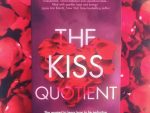Celebrating the importance of autistic and neurodivergent authors like Talia Hibbert and Helen Huang in sharing their stories.
Neurodivergent and autistic characters have been stereotypically recognized in movies like “Rain Man,” or “Music” but a great necessity to uplift the voices of disabled individuals in entertainment such as books and movies is nonetheless present. About 89% of published books are written by able-bodied authors. However, with the steady rise of diverse books being published and books being banned in various schools and states, it’s essential to illustrate disabilities by elevating disabled authors.
Mark Haddon’s “The Curious Incident of the Dog in the Night Time,” which portrays an autistic child investigating the death of a dog, is challenged in various classrooms due to its “unacceptable” content. Talia Hibbert is also challenged due to her characterization of a bisexual character in one of her novels. The removal of diverse books raises a concern about the erasure of different perspectives and the fostering of empathy for different communities. The communities could include Black, Asian, Arab, Latinx/e or Indigeneous individuals who all have different experiences and stories.
The label “autistic” still seems to provoke degradation and insults, especially on TikTok where users misspell autistic as “acoustic” under videos to make fun of someone. Autism diagnoses are increasing, and some people have deemed this an epidemic, whereas specialists have mentioned how diagnoses are beneficial in recognizing behavioral and emotional patterns (and how they might be different from other able and neurotypical individuals).
Helen Huang and Talia Hibbert are famous romance authors with new adult fiction books that revolve around autistic characters and protagonists. Their novels allow readers to explore their differences while also embracing them. While the majority of books tend to portray autistic children and their journeys (especially around their diagnosis and identity), these two authors have refreshing perspectives as autistic adults and women of color. Huang and Hibbert are TikTok sensations, with their books being listed under Amazon and eBay’s “TikTok made me buy it” shopping lists.
Helen Huang is a Vietnamese American author, who shares her experiences with her later-in-life autism diagnosis through interviews and author notes. Huang is known for her triad of novels “The Kiss Quotient,” “The Bride Test” and “The Heart Principle,” which each revolve around one of three men (two siblings and one friend), who find their romantic partners. The autistic characters in these novels are either the protagonist or the love interest, thus portraying a variety of romantic relationships between autistic and neurotypical individuals.
“The Kiss Quotient” is about econometrician Stella who hires an escort named Micheal to learn about dating and sexuality. Since she is autistic, she has never been interested in a relationship before due to her professional focus. In rom-com fashion, the protagonists begin to develop feelings for each other and bond over their different Asian cultures, Micheal’s fashion creations, and Stella’s fondness for math.
“The Bride Test” follows Micheal’s friend Khai and his marriage arrangement with Vietnamese-born Esme. The readers learn about Khai’s trauma after his friend’s death and how he feels incapable of loving due to how he shows or feels differently from his family. However, the readers also learn about immigrant Esme trying to adapt to a new language, social world and education while facing microaggressions.
“The Heart Principle” is about Khai’s older brother Quan and his newfound romantic relationship with Anna, which becomes strained after her father’s recent terminal illness diagnosis and journey upon discovering she could be autistic. At the same time, Quan is recovering from testicular cancer and healing from body dysmorphia.
Every autistic character in Huang’s books is different, portraying the various aspects of living with the disorder while also acknowledging other parts of their identity. This ranges from Stella’s strict schedules to Khai’s difficulty with emotional processing and Anna’s masking. The romcom aspects of the book encourage the readers to embrace the character’s flaws, virtues, and overall humanity.
Talia Hibbert is a Black British author, who shares her experiences of being a queer autistic woman with fibromyalgia and Ehlers-Danlos Syndrome. She is mostly known for her Brown Sisters trilogy but is also applauded for celebrating Black romance in over a dozen books.
The first book of the Brown Sisters series “Get a Life, Chloe Brown,” revolves around a protagonist with fibromyalgia, a chronic illness that causes her to be fatigued and stuck in an isolated life before meeting her love interest, Red.
The second book “Take a Hint, Dani Brown” follows Dani, a PhD student with anxiety who goes viral when British Pakistani security guard Zafir saves her from a burning building.
The third and last installment, the fan favorite, “Act Your Age, Eve Brown,” revolves around two autistic leads, the youngest Brown sister Eve, and the bed and breakfast owner Jacob as they attempt to save his understaffed workplace.
Hibbert demonstrates various intimate and authentic dimensions of disabilities and other marginalized people, specifically writing for Chloe’s people (people, especially women and Black individuals who identify as autistic).
Huang and Hibbert’s books carefully address how relationships blossom whether it’s between autistic and neurotypical characters or the relationships that form between autistic individuals. The authors’ intersectional identities are crucial in crafting stories about real people and their experiences. Their books celebrate disabled joy and autistic sexual desire. The characterization of autistic adults is crucial to avoid the infantilized perception that is upheld over disabilities. Even with Huang and Hibbert’s work, there is still a lack of disabled and neurodivergent Black, Asian, Arab, Latinx/e and Indigenous characters.
There also seems to be a lacking of queer autistic characters within literature today, which would be an intriguing point of view. Although this is a spot that Hibbert is readily discussing, social media users and reviews erase these aspects like the bisexual protagonist in “Take a Hint, Dani Brown.” The majority of books that celebrate queer and autistic experiences tend to be non-fiction novels, but fiction expands the worlds and emotions of readers through imagination and critical thinking. When exposed to diverse intersectional identities in novels, reader’s compassion is reinforced and these communities’ self-worth is encouraged.
Unique authors make unique books. Disabled authors teach their readers about identity awareness, exploration and acceptance. Huang and Hibbert guide their readers to love with and not despite, someone’s disabilities, illnesses, or body. Huang hasn’t been active on social media after the publication of her last book “The Heart Equation” but Hibbert recently released “The Roommate Risk” which stars pansexual party enthusiast Jasmine and her friend Rahul (another celebration for Black queer women!). Their creative works are indispensable for emerging adult readers exploring their identity and looking for comfort in rom-com books that encourage them to believe they deserve love.














